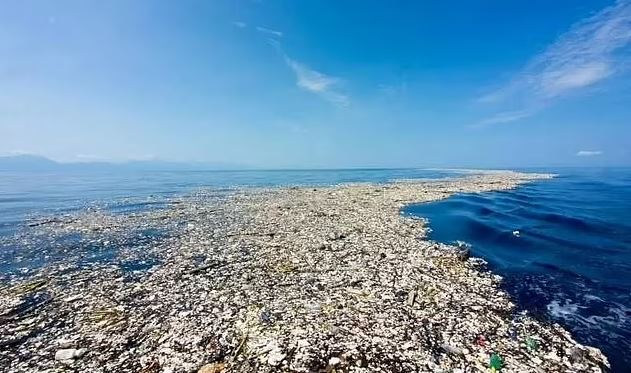THE world’s biggest dump is made up of over 100,000 tons worth of rubbish and takes up an almighty area six times the size of the UK.
Sitting in the middle of the ocean the rubbish pile has been dubbed the “Great Pacific garbage patch” made up of almost everything from abandoned toys, unused appliances and mounds of unused plastics.
The Ocean CleanupThe world’s biggest dump is made up of over 100,000 tons worth of rubbish and takes up an area six times the size of the UK[/caption]
There is thought to be two trillion pieces of plastic in the dump with marine specialists working tirelessly to remove the mound from the North Pacific Ocean
Getty – ContributorThe patch – which weighs more than 500 blue whales – is made up of a mixture of leftover items[/caption]
The floating mess has built up over the last three decades since it was first discovered off the coast of California in 1997.
Since it popped up on worried environmentalist’s radars it has grown to a shocking 620,000 square miles.
The trash site is now twice the size of the second largest state in the US, Texas, as well as being larger than France, Germany and Spain combined.
Most of the rubbish that has been collected by the watery bin collector is believed to have floated across from China, Japan, Korea and the US.
The patch – which weighs more than 500 blue whales – is made up of a mixture of leftover items.
Experts say around two trillion pieces of plastic have now gathered together in the North Pacific Ocean.
Horror pictures show plastic bottles, fishing nets, ropes and even an old fridge stuck inside the dump.
It is all thought to have joined together due to the currents in the area.
Some of the oldest pieces found floating around are over 45 years old.
In recent years after fears over the dump has increased as it started to threaten marine life and release toxic microplastics into the atmosphere at a greater level.
These threats have prompted Ocean Cleanup to kickstart a campaign to get rid of the rubbish.
Over the next 10 years the nonprofit has big aspirations of removing the floating disaster from the ocean through a $189 million (£148m) project.
One of the founders claimed the mission needed to be done after noticing there was now more “plastic than fish” in the oceans.
The group’s head of environmental and social affairs Matthias Egger told DailyMail: “We’re taking it out of the ocean while we still can. Really what we are doing is we are preventing an ecological time bomb.”
They are also hoping to use the cash to clean up as much of the world’s waterways as possible.
One of the ways they plan on doing so is through a clever piece of technology called the System 3.
Given the nickname of Josh, it has the potential to clear football pitch sized areas every five seconds.
The 1.4mile long device funnels the trash into a giant bag while keeping the fish out.
A built in radar reportedly makes a fish-repellent noise to keep them from swimming in.
For those who do get trapped, the developers ensured the net would be the “worst fishing net possible” meaning any marine life can safely escape through holes.
Egger also revealed that the trash collected will go towards building electric vehicles.
The fascinating recycling scheme saw them partner with Korean car company Kia who happily take the rubbish off the nonprofit’s hands.
Scientists have found other masses of marine debris in recent years.
Five rubbish sites are known to exist in our oceans.
One is said to be four times the size of Britain and the same size as Mexico.
Nestled between Chile and Easter Island in the South Pacific, the patch is a collection of small plastic fragments that are tricky to spot with the naked eye.
AlamyThe Ocean Cleanup are looking to remove the dump in the next two years[/caption]
AlamyThe rubbish in the oceans can badly affect the marine life as well as send toxic chemicals into the atmosphere[/caption]

